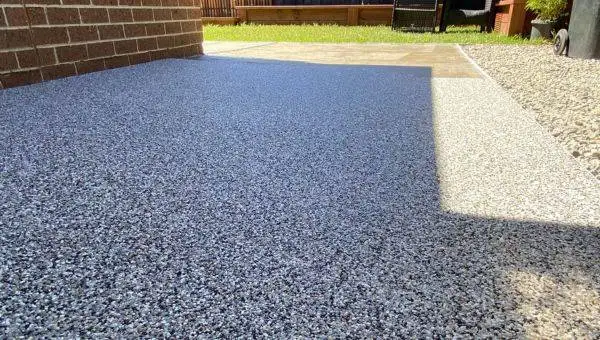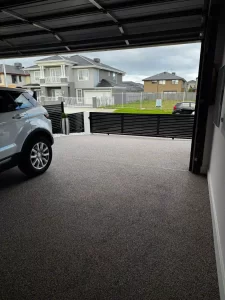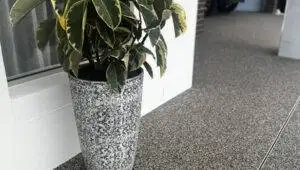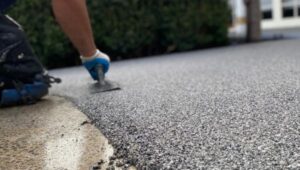Permeable paving, also known as porous pavement or pervious pavement, is a type of surface material used in roads, parking lots, sidewalks, and other paved areas that allows water to pass through it and infiltrate into the ground below.
Unlike traditional impervious surfaces such as concrete or asphalt, which cause rainwater to run off and collect in storm drains, permeable paving systems are designed to manage stormwater onsite by allowing it to permeate through the surface and into the underlying soil or a specially designed drainage layer.
Why should you use permeable paving? Generally in any new development, planning, regulations, and restrictions are required. Here are a few examples of how permeable paving can be used to get the most out of your build.
Permeable Space or Site Coverage
Permeable space, sometimes referred to as site coverage, is a term commonly used in urban planning, architecture, and environmental design. It refers to the portion of a site or land area that allows water to pass through it and infiltrate into the ground, rather than being impervious and causing runoff.
In urban contexts, especially in densely populated areas, impermeable surfaces like roads, sidewalks, roofs, and parking lots can cover significant portions of the land. When rain falls on these surfaces, it runs off into stormwater drainage systems, often carrying pollutants and causing erosion.
Permeable space, on the other hand, includes surfaces like permeable pavements, green roofs, vegetated areas, and open soil that allow rainwater to infiltrate into the ground naturally. These features help to mitigate issues related to stormwater runoff, reduce flooding, replenish groundwater, and improve water quality by filtering out pollutants.
In zoning and land use regulations, municipalities may impose requirements or incentives to encourage developers to incorporate permeable space into their projects. This can be achieved through various strategies such as implementing permeable paving materials, incorporating green infrastructure, or preserving natural vegetation.
Stormwater Management
Typically interlocking iglube modules are used to soak up stormwater. Other uses include general storm water retention and rainwater harvesting.
For free flow of water and system maintenance
The open internal structure allows for easy flash-out. Water conservation will be maximized with 95% effective open area.
For use as a soak pit, simply wrap the modules in non-woven DUX geotextile. Stormwater is piped into the modules to soak into the surrounding permeable sandy soil only.
The modules are wrapped in an impermeable geomembrane to intercept stormwater and collect rainwater.
Permeable paving is designed to manage stormwater in a more environmentally friendly manner compared to traditional impervious surfaces like concrete or asphalt.
Here’s how it works:
Water Infiltration: Permeable paving allows water to infiltrate through the surface and into the ground below. This reduces surface runoff, which is a major cause of urban flooding and can overwhelm stormwater systems.
Storage and Detention: Beneath the permeable surface, there’s typically a layer of aggregate or stone bed that acts as a reservoir for water. This stored water gradually infiltrates into the soil or is slowly released into drainage systems, reducing the peak flow rate during storms.
Filtration: As water percolates through the permeable surface and the underlying layers, it gets naturally filtered. This process removes pollutants and contaminants, improving water quality before it reaches groundwater reservoirs or nearby bodies of water.
Temperature Regulation: Permeable surfaces can help mitigate the urban heat island effect by allowing water to evaporate from the surface and through the soil, thus cooling the surrounding area.
Recharge Groundwater: By allowing water to infiltrate into the ground, permeable paving helps to recharge groundwater reserves, which is essential for maintaining healthy ecosystems and sustaining water supplies.
Reduced Maintenance: Permeable paving often requires less maintenance compared to traditional surfaces because there’s less need for repairs due to cracking or heaving caused by freeze-thaw cycles. Additionally, there’s usually less need for sweeping or cleaning because pollutants are filtered naturally.
Tree Protection
Councils often insist on retaining trees. Because they provide various environmental benefits, including combating the urban heat island effect. During construction, they must be protected in accordance with Australian Standard AS4970-2009. If you want to build within a tree protection zone, remember that they usually only allow 10% total penetration. This includes covering impervious hard surfaces. It should be noted that the use of permeable surfaces that allow water penetration into the root zone is permissible. So, if you want to build a driveway through a tree protection zone, it needs to be constructed with permeable paving.
A great deal of care is required when installing accessible driveways within TPZs. Experienced people are needed for this job. Sometimes a supervising arborist is required onsite. Especially if the pavement is installed in the structural root zone.
Overall, permeable paving offers numerous environmental benefits, including reducing stormwater runoff, improving water quality, mitigating the urban heat island effect, promoting groundwater recharge, and enhancing soil health. It also provides practical advantages such as increased safety, cost savings, regulatory compliance, and design flexibility.
Best Way To Meet These Requirements
If you want a perfect result in permeable paving, it is essential to use an expert for your project! You can trust us because of our experience. You can satisfy your curiosity by asking us any question. We are always ready to answer any questions or provide more information as needed.
So Natural Stone Carpets are always available for you.










